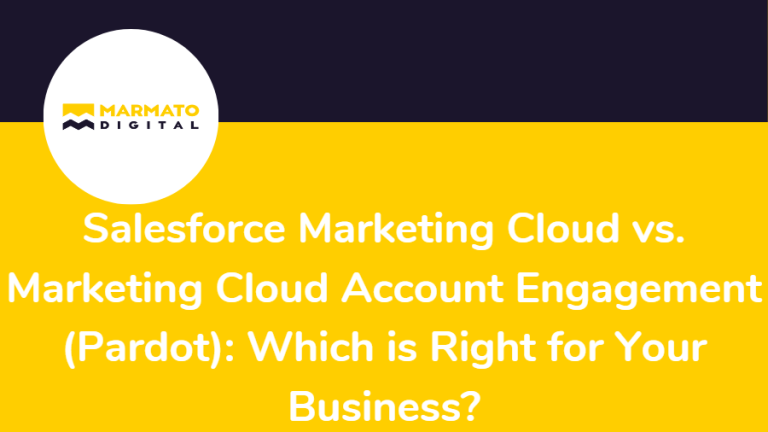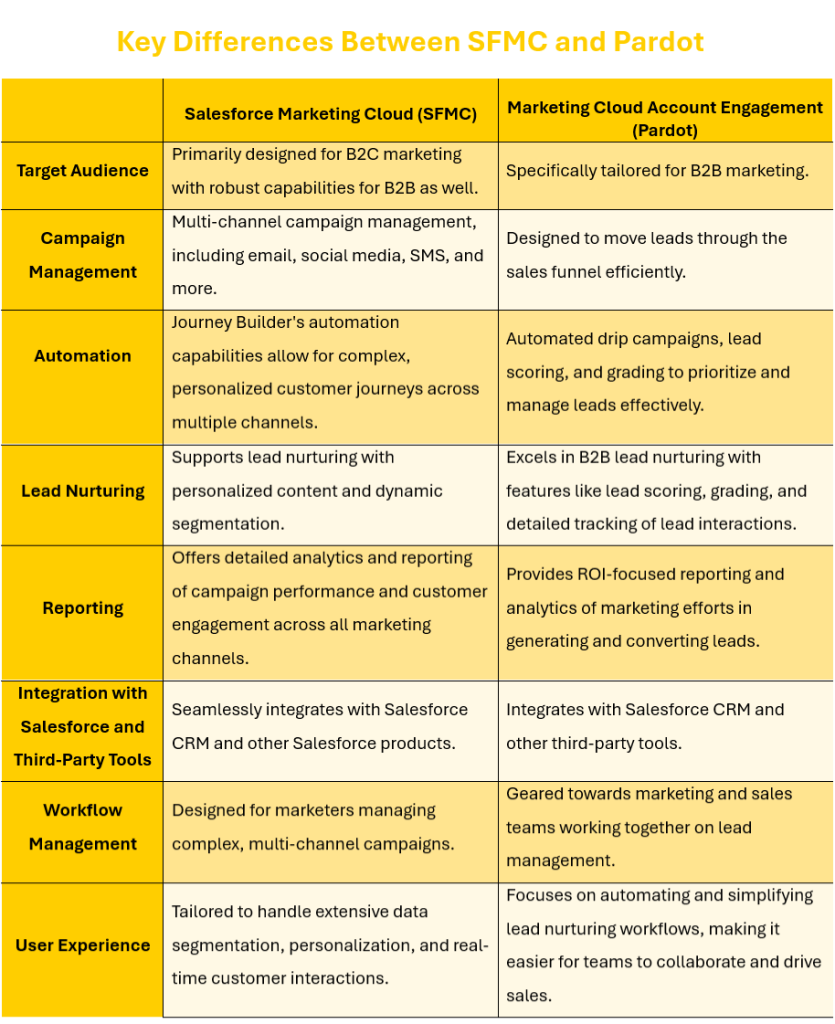Salesforce offers powerful marketing solutions to help you connect with your customers more effectively. Two of the main tools they provide are Salesforce Marketing Cloud (SFMC) and Marketing Cloud Account Engagement (formerly Pardot).
Choosing the right tool is crucial for your business. The right choice can enhance your marketing efforts, streamline your processes, and ultimately drive better results. Picking the wrong one, however, can lead to inefficiencies and missed opportunities.
Let’s explore the key differences between Salesforce Marketing Cloud and Marketing Cloud Account Engagement. This will help you make an informed decision and choose the right tool to maximize your marketing success.

What is Salesforce Marketing Cloud (SFMC)?
Salesforce Marketing Cloud is a digital marketing platform designed to help businesses create and manage personalized customer experiences across various channels. SFMC lets you connect with your customers through email, social media, mobile apps, websites, and more. It helps marketers deliver the right message to the right person at the right time.
Main Components of Salesforce Marketing Cloud (SFMC):
The main components of Salesforce Marketing Cloud are:
- Email Studio: Create and manage email campaigns with advanced segmentation, personalization, and analytics.
- Journey Builder: Design and automate customer journeys across various channels to deliver personalized experiences.
- Automation Studio: Automate repetitive marketing tasks and workflows, such as data imports, email sends, and audience segmentation.
- Social Studio: Manage, schedule, and analyze social media content and interactions across multiple social networks.
- Advertising Studio: Create and manage advertising campaigns across platforms like Facebook, Google, and LinkedIn.
- Mobile Studio: Engage customers through SMS, push notifications, and group messaging for mobile devices.
- Audience Studio: Collect and unify data from various sources to create detailed customer profiles for targeted marketing.
- Interaction Studio: Monitor and manage real-time customer interactions across channels to deliver personalized experiences.
- Data Studio: Access and share data with partners and third-party data providers to enhance audience targeting.
- Datorama: Analyze marketing performance data from multiple sources in one platform for better decision-making and optimization.
These components work together to provide a comprehensive solution for managing and optimizing marketing efforts across various channels and touchpoints.
Key Features and Capabilities of SFMC:
- Personalization and Segmentation: Tailor messages to individual customer preferences and behaviors.
- Multi-Channel Campaign Management: Run campaigns across multiple channels from a single platform.
- Data Integration and Analytics: Combine data from different sources to gain insights and measure campaign performance.
- AI and Machine Learning: Leverage Einstein AI to predict customer behaviors, optimize content delivery, and improve campaign outcomes.
- Compliance and Security: Protects customer data with robust security measures and practices to ensure compliance with data privacy regulations like GDPR and CCPA.
What is Marketing Cloud Account Engagement (Pardot)?
Salesforce Marketing Cloud Account Engagement, formerly known as Pardot, is a B2B marketing automation solution. It helps businesses create, manage, and optimize marketing campaigns to engage leads and drive sales.
Main Components of Marketing Cloud Account Engagement (Pardot):
The main components of Salesforce Marketing Cloud Account Engagement are:
- Lead Management: Capture, nurture, and manage leads throughout the sales funnel.
- Email Marketing: Create and send personalized email campaigns to engage leads.
- ROI Reporting: Track and analyze the effectiveness of marketing campaigns and measure the ROI of your marketing efforts.
- Lead Scoring and Grading: Score and grade leads based on their engagement and fit with your ideal customer profile to prioritize them for follow-up.
- Automation: Automate repetitive marketing tasks such as email sends, follow-ups, and lead nurturing to streamline marketing processes.
- Forms and Landing Pages: Create forms and landing pages to capture lead information.
- Social Media Marketing: Schedule, manage, and track engagement and interactions on social media platforms.
- Salesforce Integration: Sync lead and campaign data with Salesforce CRM and ensure seamless alignment between marketing and sales efforts.
- Reporting and Analytics: Access detailed reports on campaign performance and lead engagement and make data-driven decisions to optimize marketing strategies.
- Engagement Studio: Design, personalize, and automate complex lead nurturing journeys based on the lead actions and preferences.
Key Features and Capabilities of Pardot:
- Lead Scoring and Grading: Rank leads based on their engagement and fit to prioritize follow-ups.
- B2B Marketing Automation: Automate repetitive marketing tasks to save time and improve efficiency.
- Alignment with Sales Teams: Share lead insights with sales teams to ensure coordinated efforts and better conversion rates.
Key Differences Between Salesforce Marketing Cloud and Marketing Cloud Account Engagement:

Which Tool to Choose for Your Business?
Choosing between Salesforce Marketing Cloud and Marketing Cloud Account Engagement depends on several key factors:
1. Assessing Business Needs:
- Target Audience: Determine whether your primary audience is consumers (B2C) or businesses (B2B). Marketing Cloud is typically better for B2C, while Account Engagement is tailored for B2B.
- Marketing Goals: Identify your main marketing objectives. If you aim to create multi-channel campaigns and personalize customer experiences, Marketing Cloud may be the right choice. Account Engagement might be more suitable if you focus on lead generation, nurturing, and aligning marketing with sales.
- Team Structure: Consider the expertise and size of your marketing and sales teams. Marketing Cloud requires more technical skills to manage complex campaigns, whereas Account Engagement is designed to streamline collaboration between marketing and sales.
- Budget: Evaluate your budget for marketing tools. Marketing Cloud generally requires a larger investment due to its extensive capabilities, while Account Engagement can be more cost-effective for B2B marketing needs.
2. Scenario-Based Recommendations:
- Small to Medium-Sized Businesses (SMBs):
– B2C Focus: If you are an SMB targeting consumers with personalized marketing campaigns across multiple channels, Marketing Cloud is a good fit.
– B2B Focus: Account engagement is ideal for SMBs targeting other businesses, especially those focusing on lead generation and nurturing.
- Large Enterprises:
– B2C Focus: Large enterprises with extensive customer bases and complex marketing needs should opt for Marketing Cloud to leverage its robust multi-channel capabilities and data analytics.
– B2B Focus: Enterprises with large sales teams and a focus on high-quality lead management should choose Account Engagement to effectively align marketing and sales efforts.
3. Future-Proofing Your Choice:
- Scalability: Ensure the chosen tool can scale with your business as it grows. Marketing Cloud offers extensive capabilities to support complex marketing strategies as your business expands. Account Engagement scales well for B2B companies looking to deepen their lead nurturing and sales alignment.
- Future Growth: Anticipate your future marketing needs. If you plan to expand your marketing channels and require detailed customer journey mapping, Marketing Cloud is a forward-looking choice. Account Engagement is ideal if your growth strategy involves expanding your sales team and enhancing lead management.
Conclusion:
To conclude, it is crucial to thoroughly evaluate your business needs before deciding. Understanding your marketing objectives and the specific requirements of your industry will help you select the tool that will best support your growth and success.
Elevate Your Marketing Campaigns with Marmato Digital!
Unlock the full potential of your marketing campaigns with Marmato Digital. Our expertise in both Salesforce Marketing Cloud (SFMC) and Marketing Cloud Account Engagement (Pardot) ensures that your business leverages the right tools for optimal results. Whether you want to create dynamic email campaigns, automate lead nurturing, or gain deep insights through advanced analytics, Marmato Digital is here to help.
Partner with us to elevate your marketing strategies and achieve outstanding performance across all platforms. Contact us today to get started!
Subscribe to Newsletter
Get our latest blogs directly to your inbox.


